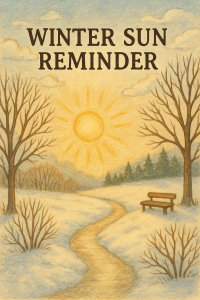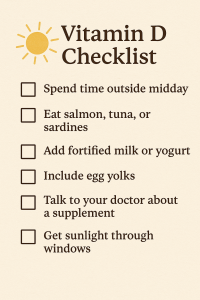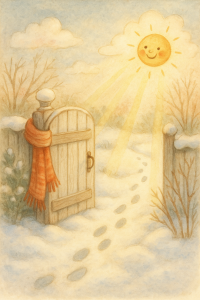Winter Sunlight & Vitamin D:
How to Stay Nourished When the Days Get Short
A gentle winter wellness note from Henchy Family Gardens

Why Vitamin D Matters Even More in Winter
Shorter days = less natural exposure. Most of us go to work or school when it’s still dim and come home after sunset. Even outdoor workers struggle in winter. Weaker UVB rays. In winter, the angle of the sun changes. UVB (the rays that help your skin produce Vitamin D) barely reaches us in many places. More indoor living. It’s cozy inside—but it also limits natural light. Vitamin D supports:- A strong immune system
- Bone health (helps your body absorb calcium)
- Mood regulation
- Hormone function
- Reduced inflammation
Signs You Might Be Low in Vitamin D
Everyone is different, but common symptoms include:- Feeling down or more emotional
- Fatigue or lower energy
- Muscle aches or weakness
- Getting sick more often
- Trouble concentrating
- Increased cravings for carbs or comfort foods
Ways to Boost Vitamin D in Winter
🌤️ 1. Take Intentional Sun Breaks
Even on cold days, step outside for 10–20 minutes when the sun is highest (usually between 11am–2pm).- Stand in a bright spot.
- Roll your shoulders back.
- Let your face relax into the light.

🍳 2. Include Vitamin D-Rich Foods
Try adding:- Salmon, tuna, or sardines
- Egg yolks
- Fortified milk or plant milks
- Mushrooms exposed to sunlight
- Swiss cheese
- Yogurt

💊 3. Consider a Vitamin D Supplement (with guidance)
Most people benefit from a winter Vitamin D3 supplement—but always check with your doctor about dosage. A simple daily pill can make a big difference.Ways Your Garden Can Help Boost Vitamin D in Winter
Even when the soil is resting, your garden can still support your winter wellness.🌱 1. Winter Garden Walks = Sunlight Therapy
Bundle up and walk your garden paths, even for a few minutes a day. This helps:- Increase your sun exposure
- Boost your mood
- Keep you connected to your plants and rhythms

🍄 2. Grow Vitamin D–Boosting Mushrooms Indoors
Did you know mushrooms produce Vitamin D when exposed to sunlight or UV light? You can:- Grow oyster mushrooms indoors
- Place them near a bright window
- Set them in the sun (or use a UV lamp) just before harvesting
🌿 3. Keep an Herb Garden Going Indoors
Herbs won’t give you Vitamin D, but they support winter wellness—especially when used in warming stews, teas, and soups. Good indoor herbs for winter:- Rosemary
- Thyme
- Parsley
- Mint
- Basil (with warm light)
☀️ 4. Create a “Sun Spot” in Your Garden (or Yard)
Choose a sunny south-facing area, clear it off, and make it an inviting place to sit for a few minutes each day. Even in cold weather, this intentional space encourages you to step outside and soak up whatever light winter gives.🪴 5. Start Seedlings Near Bright Windows
Late winter is perfect for starting seeds indoors. This gives you:- Time in bright windows
- More natural light exposure
- A mental boost (because seedlings = hope!)




No comments:
Post a Comment